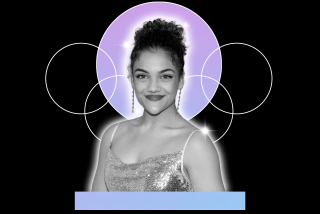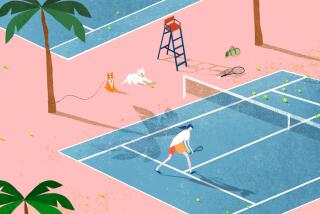It Serves as Whole New Court for Shriver : Tennis: Competition is no match for her, but she is savoring opportunity for a unique experience.
- Share via
HAVANA — What’s a millionaire like Pam Shriver doing in a place like this, far, far from the tennis courts at Wimbledon, Roland Garros and the White House?
“I think she has a chance to win a gold medal, basically,” said Jamaica’s Henrietta Harris, when asked that question after losing to Shriver in 39 minutes Wednesday at the Pan American Games.
Actually, Shriver has a chance to win three gold medals. After receiving a first-round bye and beating Harris, 6-0, 6-0, in the second round, she already has reached today’s singles quarterfinals. She also is entered in the doubles and mixed doubles competitions, both of which begin for her today.
“If I have to set a goal, it would be to win all three,” she said Wednesday. “Starting tomorrow, I have three matches a day--nine in the next three days. I don’t care what the standard of competition is, that’s a lot of matches. It won’t be easy.”
But that’s not what Pam Shriver is doing here.
Attempting to regain her top-10 status while still recovering from last year’s shoulder surgery, Shriver, 29, has climbed back to a ranking of 33rd in the world. And if that were the only thing that mattered to her, she would be playing on the professional tour this week in Canada, refining her game for the U.S. Open later this month.
Instead, she agreed to come here as player-coach of the U.S. team, which also includes fellow pro Donna Faber, a late substitute for the injured Kathy Jordan, and David Dilucia of Notre Dame.
“Late in my career, I’ve been very much wanting to participate in events that are unique to anything else I’ve experienced, and this is about as unique as it gets,” she said. “The opportunity to come to Cuba won’t happen again, not likely in my career. This was too interesting to miss.
“I’m disappointed that other players didn’t want to come. The U.S. (Tennis Assn.) sent a letter to the top 100 men and women. Only one other woman besides Donna and Kathy and I showed some interest.
“The men, at first, some players said yes. But then we got letters about cholera vaccines, information you don’t get when you play the Virginia Slims of Los Angeles. I don’t know if that turned some players off.”
There are worse places to be than where Shriver was Wednesday while talking with reporters. Cooled by breezes from the nearby sea, she sat on the veranda overlooking the 12 Laykold courts--there also are two clay courts on the grounds--at the new 19th of November Tennis Center. It is named for the National Sports Day that Cubans celebrate.
The center is not luxurious by U.S. country club standards. But as a place for the public to play, which it will become when the Games end, it is more than adequate.
Asked if there was anything lacking here that tennis players have come to expect at other tournaments, the 23-year-old Harris, No. 1 player at Florida International University for two years, said: “Towels would be nice.”
Shriver didn’t need one, barely breaking a sweat Wednesday. That is a good gauge of her dominance because people in Havana generally perspire even during siestas.
“She was decent enough,” Shriver said charitably of Harris. “You could play worse players in this draw.”
Indeed, Harris had won, 6-1, 6-0, over Marcia Osorlo of Honduras in the first round. Before that match, Osorlo approached Shriver, told her how much she admired her and said that she was hoping to win so that she could face her. Even when she lost, she still had her coach take a picture of her and Shriver together.
Most of the tennis players here have wanted to meet Shriver, a couple even asking for her autograph.
As for Shriver, a dedicated sports fan from Baltimore, she said that she wanted to meet Walt Williams, a basketball player from the University of Maryland.
But when she introduced herself to him at the athletes’ village, she said that he spoke two words to her and moved on.
So perhaps they won’t correspond, as she still does with a wrestler, a swimmer and two rowers whom she met while living in the athletes’ village during the 1988 Olympic Games at Seoul, South Korea, where she and Zina Garrison won the gold medal in women’s doubles.
“The village here is more comfortable in some ways than the one in Seoul,” Shriver said. “There’s more comfortable furniture in the living room and closets for our clothes.
“There were seven of us in a four-bedroom apartment in Seoul. Here, there are three of us in a two-bedroom apartment. Being player-coach, I told the other two (Faber and Jordan) they have to room together.”
She did not seem as impressed with the food, but she brought some of her own. “We have a refrigerator that does what it’s supposed to do,” she said.
Shriver said that she found time to walk around Havana Monday, the day after she arrived.
“I’m so frustrated because I don’t speak Spanish,” she said. “I walked up and down the alleys, where I could see inside some of the buildings. I’m interested to see how people live.
“Everyone had a TV and everyone was tuned into the Games. It looked like they took care of what they had, not to say that they had a whole lot. I would love to speak Spanish so that I could ask how everyone is feeling, whether they’re happy. Right now, they seem to be feeling great because their athletes are spanking everyone.”
What will she report to her fellow Republican and tennis partner, George Bush, the next time they play on the White House courts?
“Nothing he doesn’t already know,” she said. “I’d say the people are hospitable so far. I haven’t had any unpleasant experiences with the people. Obviously, the system needs some adjustment. But I don’t know enough to make any real profound political statements.”
As for statements she has heard from Cubans, she practiced with one of their male players Tuesday.
“He liked how I volleyed,” she said.
More to Read
Go beyond the scoreboard
Get the latest on L.A.'s teams in the daily Sports Report newsletter.
You may occasionally receive promotional content from the Los Angeles Times.










